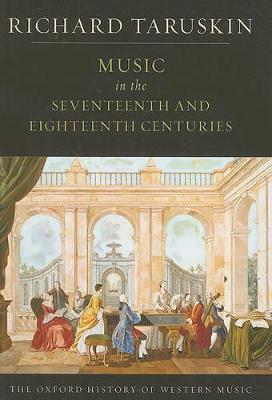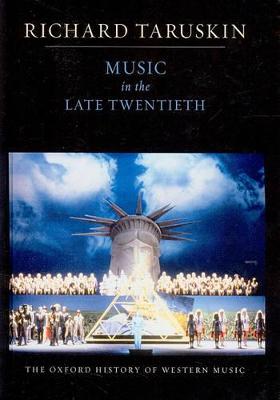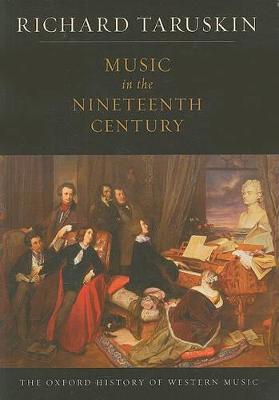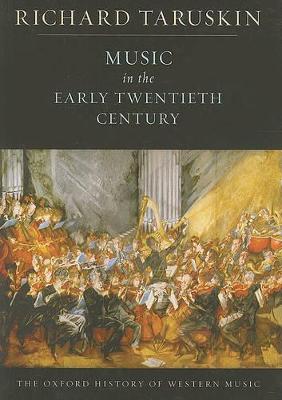The Oxford History of Western Music
5 total works
The universally acclaimed and award-winning Oxford History of Western Music is the eminent musicologist Richard Taruskin's provocative, erudite telling of the story of Western music from its earliest days to the present. Each book in this superlative five-volume set illuminates-through a representative sampling of masterworks-the themes, styles, and currents that give shape and direction to a significant period in the history of Western music.
Music in the Seventeenth and Eighteenth Centuries , the second volume Richard Taruskin's monumental history, illuminates the explosion of musical creativity that occurred in the seventeenth and eighteenth centuries. Examining a wealth of topics, Taruskin looks at the elegant masques and consort music of Jacobean England, the Italian concerto style of Corelli and Vivaldi, and the progression from Baroque to Rococo to romantic style. Perhaps most important, he offers a fascinating account of the
giants of this period: Bach, Handel, Mozart, Haydn, and Beethoven. Laced with brilliant observations, memorable musical analysis, and a panoramic sense of the interactions between history, culture, politics, art, literature, religion, and music, this book will be essential reading for anyone who
wishes to understand this rich and diverse period.
Music in the Seventeenth and Eighteenth Centuries , the second volume Richard Taruskin's monumental history, illuminates the explosion of musical creativity that occurred in the seventeenth and eighteenth centuries. Examining a wealth of topics, Taruskin looks at the elegant masques and consort music of Jacobean England, the Italian concerto style of Corelli and Vivaldi, and the progression from Baroque to Rococo to romantic style. Perhaps most important, he offers a fascinating account of the
giants of this period: Bach, Handel, Mozart, Haydn, and Beethoven. Laced with brilliant observations, memorable musical analysis, and a panoramic sense of the interactions between history, culture, politics, art, literature, religion, and music, this book will be essential reading for anyone who
wishes to understand this rich and diverse period.
The universally acclaimed and award-winning Oxford History of Western Music is the eminent musicologist Richard Taruskin's provocative, erudite telling of the story of Western music from its earliest days to the present. Each book in this superlative five-volume set illuminates-through a representative sampling of masterworks-the themes, styles, and currents that give shape and direction to a significant period in the history of Western music.
Music in the Late Twentieth Century is the final installment of the set, covering the years from the end of World War II to the present. In these pages, Taruskin illuminates the great compositions of recent times, offering insightful analyses of works by Aaron Copland, John Cage, Milton Babbitt, Benjamin Britten, Steve Reich, and Philip Glass, among many others. He also looks at the impact of electronic music and computers, the rise of pop music and rock 'n' roll, the advent of postmodernism,
and the contemporary music of Laurie Anderson, John Zorn, and John Adams. Laced with brilliant observations, memorable musical analysis, and a panoramic sense of the interactions between history, culture, politics, art, literature, religion, and music, this book will be essential reading for anyone
who wishes to understand this rich and diverse period.
Music in the Late Twentieth Century is the final installment of the set, covering the years from the end of World War II to the present. In these pages, Taruskin illuminates the great compositions of recent times, offering insightful analyses of works by Aaron Copland, John Cage, Milton Babbitt, Benjamin Britten, Steve Reich, and Philip Glass, among many others. He also looks at the impact of electronic music and computers, the rise of pop music and rock 'n' roll, the advent of postmodernism,
and the contemporary music of Laurie Anderson, John Zorn, and John Adams. Laced with brilliant observations, memorable musical analysis, and a panoramic sense of the interactions between history, culture, politics, art, literature, religion, and music, this book will be essential reading for anyone
who wishes to understand this rich and diverse period.
Music from the Earliest Notations to the Sixteenth Century
by Richard Taruskin
Published 27 August 2009
The universally acclaimed and award-winning Oxford History of Western Music is the eminent musicologist Richard Taruskin's provocative, erudite telling of the story of Western music from its earliest days to the present. Each book in this superlative five-volume set illuminates-through a representative sampling of masterworks- the themes, styles, and currents that give shape and direction to a significant period in the history of Western music.
This first volume in Richard Taruskin's majestic history, Music from the Earliest Notations to the Sixteenth Century , sweeps across centuries of musical innovation to shed light on the early forces that shaped the development of the Western classical tradition. Beginning with the invention of musical notation more than a thousand years ago, Taruskin addresses topics such as the legend of Saint Gregory and Gregorian chant, Augustine's and Boethius's thoughts on music, the liturgical dramas of
Hildegard of Bingen, the growth of the music printing business, the literary revolution and the English madrigal, the influence of the Reformation and the Counter-Reformation, and the operas of Monteverdi. Laced with brilliant observations, memorable musical analysis, and a panoramic sense of the
interactions between history, culture, politics, art, literature, religion, and music, this book will be essential reading for anyone who wishes to understand this rich and diverse period.
This first volume in Richard Taruskin's majestic history, Music from the Earliest Notations to the Sixteenth Century , sweeps across centuries of musical innovation to shed light on the early forces that shaped the development of the Western classical tradition. Beginning with the invention of musical notation more than a thousand years ago, Taruskin addresses topics such as the legend of Saint Gregory and Gregorian chant, Augustine's and Boethius's thoughts on music, the liturgical dramas of
Hildegard of Bingen, the growth of the music printing business, the literary revolution and the English madrigal, the influence of the Reformation and the Counter-Reformation, and the operas of Monteverdi. Laced with brilliant observations, memorable musical analysis, and a panoramic sense of the
interactions between history, culture, politics, art, literature, religion, and music, this book will be essential reading for anyone who wishes to understand this rich and diverse period.
The universally acclaimed and award-winning Oxford History of Western Music is the eminent musicologist Richard Taruskin's provocative, erudite telling of the story of Western music from its earliest days to the present. Each book in this superlative five-volume set illuminates-through a representative sampling of masterworks-the themes, styles, and currents that give shape and direction to a significant period in the history of Western music.
In Music in the Nineteenth Century , Richard Taruskin offers a panoramic tour of this magnificent century in the history music. Major themes addressed in this book include the romantic transformation of opera, Franz Schubert and the German lied, the rise of virtuosos such as Paganini and Liszt, the twin giants of nineteenth-century opera, Richard Wagner and Giuseppe Verdi, the lyric dramas of Bizet and Puccini, and the revival of the symphony by Brahms. Laced with brilliant observations,
memorable musical analysis, and a panoramic sense of the interactions between history, culture, politics, art, literature, religion, and music, this book will be essential reading for anyone who wishes to understand this rich and diverse period.
In Music in the Nineteenth Century , Richard Taruskin offers a panoramic tour of this magnificent century in the history music. Major themes addressed in this book include the romantic transformation of opera, Franz Schubert and the German lied, the rise of virtuosos such as Paganini and Liszt, the twin giants of nineteenth-century opera, Richard Wagner and Giuseppe Verdi, the lyric dramas of Bizet and Puccini, and the revival of the symphony by Brahms. Laced with brilliant observations,
memorable musical analysis, and a panoramic sense of the interactions between history, culture, politics, art, literature, religion, and music, this book will be essential reading for anyone who wishes to understand this rich and diverse period.
The universally acclaimed and award-winning Oxford History of Western Music is the eminent musicologist Richard Taruskin's provocative, erudite telling of the story of Western music from its earliest days to the present. Each book in this superlative five-volume set illuminates-through a representative sampling of masterworks-the themes, styles, and currents that give shape and direction to a significant period in the history of Western music.
Music in the Early Twentieth Century , the fourth volume in Richard Taruskin's history, looks at the first half of the twentieth century, from the beginnings of Modernism in the last decade of the nineteenth century right up to the end of World War II. Taruskin discusses modernism in Germany and France as reflected in the work of Mahler, Strauss, Satie, and Debussy, the modern ballets of Stravinsky, the use of twelve-tone technique in the years following World War I, the music of Charles Ives,
the influence of peasant songs on Bela Bartok, Stravinsky's neo-classical phase and the real beginnings of 20th-century music, the vision of America as seen in the works of such composers as W.C. Handy, George Gershwin, and Virgil Thomson, and the impact of totalitarianism on the works of a range of
musicians from Toscanini to Shostakovich
Music in the Early Twentieth Century , the fourth volume in Richard Taruskin's history, looks at the first half of the twentieth century, from the beginnings of Modernism in the last decade of the nineteenth century right up to the end of World War II. Taruskin discusses modernism in Germany and France as reflected in the work of Mahler, Strauss, Satie, and Debussy, the modern ballets of Stravinsky, the use of twelve-tone technique in the years following World War I, the music of Charles Ives,
the influence of peasant songs on Bela Bartok, Stravinsky's neo-classical phase and the real beginnings of 20th-century music, the vision of America as seen in the works of such composers as W.C. Handy, George Gershwin, and Virgil Thomson, and the impact of totalitarianism on the works of a range of
musicians from Toscanini to Shostakovich




